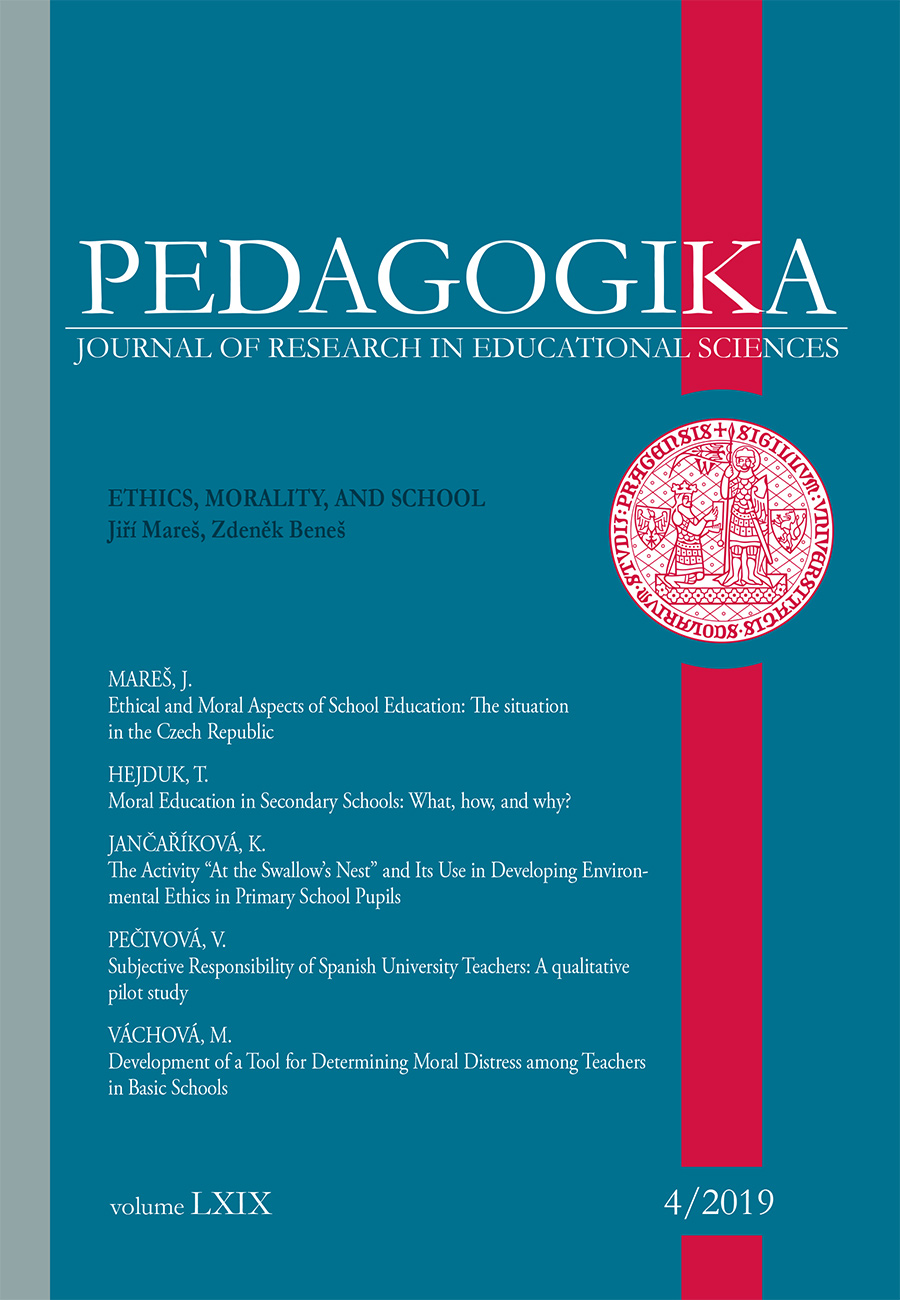Development of a Tool for Determining Moral Distress among Teachers in Basic Schools
DOI:
https://doi.org/10.14712/23362189.2019.1524Keywords:
teacher, moral distress, professional morally dilemmatic situations, questionnaireAbstract
Abstract: Morality can be linked with education in the broadest sense in connection with the various topics associated with this phenomenon. This manuscript focuses on the decision-making processes in contemporary teachers’ work that are connected with morally dilemmatic situations. The text deals with the problematics of moral dilemmas in teachers’ work. It specifically focuses on the situation in Czech basic education. The second half of the 20th century was characterized by an eff ort to professionalize various occupations, among them also teaching. If we are to accept the rather problematic concept of the professionalization of teaching, it is necessary to (constantly) fulfil the attributes of the profession. These include professional autonomy. Its boundary is disputed and relativized. Social pressure on schools, manager-like styles of running schools, and the increasing influence of parents on schools pose risks of improper interventions into professional decision making in teachers’ work. In his work a teacher is often confronted with situations which require him to make a professional moral choice. These are conflict situations that require the teacher to make a fundamental decision and, depending on his professional and personal characteristics, they have significant consequences for his subsequent work. Within his professional field the teacher then has to give in to social pressure and to adopt his approach to something that he does not identify with, or he has to speak out against this pressure and confront the situation. In these situations in which the teacher has to act against his own convictions and gives in to pressure from his environment, the culture of his own institution, or his colleagues and parents, the long-term effect and constant presence of these dilemmas may lead to him suffering from professional moral distress. It is possible to assume that the emergence of professional moral distress is also dependent on the individual characteristics of each teacher. These include, for example, the length of his professional career in the institution and his experience or personal characteristics. As Mareš (2017a) states, so far only scholars from abroad have dealt with the theoretical identification and diagnostics of moral distress. This manuscript declares that the prevailing sources of professional dilemmas among teachers in basic schools come from the management, parents, colleagues, and increasing (unsolvable) demands from education policy.
Keywords: teacher, moral distress, professional morally dilemmatic situations, questionnaire.
References
Almeida, H. (2013). A longitudinal study about stress, burnout and coping. International Journal of Human Resource Studies, 3(2), 109-125.
https://doi.org/10.5296/ijhrs.v3i2.4136
Corley, M. (2002). Nurse moral distress: a proposed theory and research agenda. Nursing Ethics, 9(6), 636-650.
https://doi.org/10.1191/0969733002ne557oa
PMid:12450000
Crane, M. F., Bayl-Smith, P., & Cartmill, J. (2013). A recommendation for expanding the definition of moral distress experienced in the workplace. Australian and New Zealand Journal of Organisational Psychology, 6(1), 1-9.
https://doi.org/10.1017/orp.2013.1
Cranston, N., Ehrich, L. C., & Kimber, M. (2006). Ethical dilemmas: the "bread and butter" of educational leaders' lives. Journal of Educational Administration. 44(2), 106-121.
https://doi.org/10.1108/09578230610652015
Etzioni, A. (Ed.). (1969). The semi-professions and their organization. London: The Free Press.
Hargreaves, E. A. (2000). Four ages of professionalism and professional learning. Teaching and Teacher Education, 6(2), 151-182.
https://doi.org/10.1080/713698714
Helus, Z., & Lukášová, H. (2012). Proměny pojetí vzdělávání a školního hodnocení: filozofická východiska a pedagogické souvislosti [Transformations of the conception of education and of the school evaluation: philosophical premises and pedagogical context]. Praha: Asociace waldorfských škol ČR.
Huberman, A. M. (1978). L'evolution de la formation americaine. Une analyse contextuelle de la formation des enseignants aux Etats-Unis et quelques points de comparaison avec Europe francophone. In M. Debesse & G. Mialaret (Eds.), Traite des sciences pedagogiques. Tome 7: Fonction et Formation des Enseignants (pp. 315-340). Paris: PUF.
Jameton, A. (1993). Dilemmas of moral distress: moral responsibility and nursing practice. AWHONN's Clinical Issues in Perinatal and Women's heaLth Nursing, 4(4), 542-551.
Janík, T. (2013). Od reformy kurikula k produktivní kultuře vyučování a učení [From the curriculum reform to a productive culture of teaching and learning]. Pedagogická orientace, 23(5), 634-663.
https://doi.org/10.5817/PedOr2013-5-634
Mareš, J. (2017a). Morální distres školních psychologů [Moral distress of school psychologists]. Pedagogická orientace, 27(2), 308-343.
https://doi.org/10.5817/PedOr2017-2-308
Mareš, J. (2017b). Morální distres učitelů - skrytý problém [Moral distress of teachers - a hiddenproblem]. Pedagogika, 67(1), 27-55.
https://doi.org/10.14712/23362189.2017.390
Straková, J. (2007). Kurikulární reforma z pohledu šetření Kalibro [Curriculum reform from the perspective of the Kalibro research]. Pedagogika, 57(1), 21-36.
Štech, S. (2008). Profese učitele [The teaching profession]. In S. Bendl & A. Kucharská (Eds.), Kapitoly ze školní pedagogiky a školní psychologie: skripta pro studenty vykonávající pedagogickou praxi (pp. 139-144). Prague: Charles University, Faculty of Education.
Vašutová, J. (2004). Profese učitele v českém vzdělávacím kontextu [The teacher's profession in the Czech educational context]. Brno: Paido.
Váchová, M. (2017). Inkluzivní vzdělávání z pohledu učitelů na vybraných základních školách v České republice [Inclusive education from the perspective of teachers in selected basic schools in the Czech Republic]. (Bachelor's thesis.) České Budějovice: University of South Bohemia, Faculty of Health and Social Sciences.
Webster, G., & Baylis, F. (2000). Moral residue. In S. B. Rubin & L. Zoloth (Eds.), Margin of error: The ethics of mistakes in the practice of medicine (pp. 217-232). Hagerstown: University Publishing Group.



